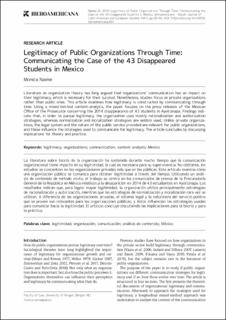Legitimacy of Public Organizations Through Time: Communicating the Case of the 43 Disappeared Students in Mexico
Journal article, Peer reviewed
Published version
Permanent lenke
https://hdl.handle.net/11250/2753648Utgivelsesdato
2020Metadata
Vis full innførselSamlinger
- Faculty of Law [2479]
- Registrations from Cristin [9791]
Originalversjon
Ibero-Americana, Nordic Journal of Latin American Studies. 2020, 49(1), 85–95 10.16993/iberoamericana.497Sammendrag
In 2019 the European Economic Area Agreement (EEA) celebrated 25 years of promoting the European integration and cooperation in economic and many other relevant matters. Climate issues were, however, not included in the negotiations of the EEA Agreement. Combating climate change is thus not listed as one of the objectives of the EEA environmental law. Furthermore, the Main Part of the EEA Agreement has not been updated since its entry into force. Still, the Agreement is the most relevant platform for the European cooperation in combating climate change. This article sheds light on the EU/EEA climate law and policy from the perspective of Norway that due to its energy sector is quite unique in the context of the EU climate policy. Moreover, Norway not only participates in most of the EU initiatives, but also takes actions to strengthen the EU/EEA cooperation in climate action and promotes setting ambitious climate goals.

